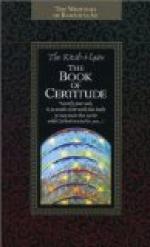In another passage of the Gospel it is written: “And it came to pass that on a certain day the father of one of the disciples of Jesus had died.” That disciple reporting the death of his father unto Jesus, asked for leave to go and bury him. Whereupon, Jesus, that Essence of Detachment, answered and said: “Let the dead bury their dead."(89)
In like manner, two of the people of Kufih went to ’Ali, the Commander of the Faithful. One owned a house and wished to sell it; the other was to be the purchaser. They had agreed that this transaction should be effected and the contract be written with the knowledge of ’Ali. He, the exponent of the law of God, addressing the scribe, said: “Write thou: ’A dead man hath bought from another dead man a house. That house is bounded by four limits. One extendeth toward the tomb, the other to the vault of the grave, the third to the Sirat, the fourth to either Paradise or hell.’” Reflect, had these two souls been quickened by the trumpet-call of ’Ali, had they risen from the grave of error by the power of his love, the judgment of death would certainly not have been pronounced against them.
In every age and century, the purpose of the Prophets of God and their chosen ones hath been no other but to affirm the spiritual significance of the terms “life,” “resurrection,” and “judgment.” If one will ponder but for a while this utterance of ’Ali in his heart, one will surely discover all mysteries hidden in the terms “grave,” “tomb,” “sirat,” “paradise” and “hell.” But oh! how strange and pitiful! Behold, all the people are imprisoned within the tomb of self, and lie buried beneath the nethermost depths of worldly desire! Wert thou to attain to but a dewdrop of the crystal waters of divine knowledge, thou wouldst readily realize that true life is not the life of the flesh but the life of the spirit. For the life of the flesh is common to both men and animals, whereas the life of the spirit is possessed only by the pure in heart who have quaffed from the ocean of faith and partaken of the fruit of certitude. This life knoweth no death, and this existence is crowned by immortality. Even as it hath been said: “He who is a true believer liveth both in this world and in the world to come.”
If by “life” be meant this earthly life, it is evident that death must needs overtake it.
Similarly, the records of all the scriptures bear witness to this lofty truth and this most exalted word. Moreover, this verse of the Qur’an, revealed concerning Hamzih, the “Prince of Martyrs,"(90) and Abu-Jahl, is a luminous evidence and sure testimony of the truth of Our saying: “Shall the dead, whom We have quickened, and for whom We have ordained a light whereby he may walk among men, be like him, whose likeness is in the darkness, whence he will not come forth?"(91) This verse descended from the heaven of the Primal Will at a time when Hamzih had already been invested with the sacred mantle of




